 Each year the College of the Environment provides faculty-student research grants to provide faculty and their students an opportunity to conduct research that would not have been otherwise possible. Helen Poulos, adjunct assistant professor of environmental studies, and environmental studies & earth and environmental sciences major Ally Detre ‘22 launched a faculty-student research collaboration during the 2020-21 academic year working on a dataset documenting native woody plant recovery in the Big Bend Region of the Rio Grande. Ally received a COE summer fellowship in 2021 that allowed her to gain first-hand knowledge of the area with a trip to Big Bend National Park to resurvey a stretch of the river that experienced recent native riparian plant recovery and to work as a GIS technician for the Science and Resources Management division of Big Bend National Park.
Each year the College of the Environment provides faculty-student research grants to provide faculty and their students an opportunity to conduct research that would not have been otherwise possible. Helen Poulos, adjunct assistant professor of environmental studies, and environmental studies & earth and environmental sciences major Ally Detre ‘22 launched a faculty-student research collaboration during the 2020-21 academic year working on a dataset documenting native woody plant recovery in the Big Bend Region of the Rio Grande. Ally received a COE summer fellowship in 2021 that allowed her to gain first-hand knowledge of the area with a trip to Big Bend National Park to resurvey a stretch of the river that experienced recent native riparian plant recovery and to work as a GIS technician for the Science and Resources Management division of Big Bend National Park.
faculty
poulos receives $300k nasa research grant
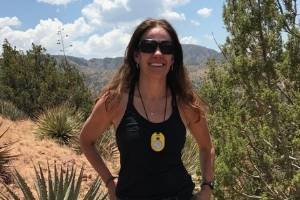 Dr. Helen Poulos, adjunct assistant professor of environmental studies, has been awarded a $300,000 NASA grant to examine forest type-conversion through the lens of evapotranspiration (plant sweat) in response to high-severity wildfire in southeastern Arizona. Poulos and her team will conduct their research using imagery gathered by the ECOSTRESS sensor mounted on the International Space Station. It will be the first-ever test of the ECOSTRESS sensor’s applicability for wildfire-related research.
Dr. Helen Poulos, adjunct assistant professor of environmental studies, has been awarded a $300,000 NASA grant to examine forest type-conversion through the lens of evapotranspiration (plant sweat) in response to high-severity wildfire in southeastern Arizona. Poulos and her team will conduct their research using imagery gathered by the ECOSTRESS sensor mounted on the International Space Station. It will be the first-ever test of the ECOSTRESS sensor’s applicability for wildfire-related research.
Plants facing the aftermath of wildfire often have insufficient water, which causes their temperature to rise. The ECOSTRESS radiometer measures the temperatures of plants across Earth to an extraordinarily accurate degree. Poulos’s NASA-funded project will specifically investigate the effects of the 2011 Horseshoe Two Fire on post-fire plant and site water balance and evaluate the potential of using data gathered from the ECOSTRESS sensor to predict wildfire effects on plant community structure and water relations in an Arizona Sky Island pine-oak forest.
machado-allison teaches first-ever envs course taught in spanish
This spring, Wesleyan will offer its first-ever ENVS course taught in Spanish, ENVS283/LAST383, Venezuela: The Effect of Oil Discovery on People, the Environment, and Democracy. The course will be taught by Antonio Machado-Allison, former Menakka and Essel Bailey ‘66 Visiting Scholar in the College of the Environment and current research fellow in the College of the Environment. He was recently named a member of the Academia de Ciencias de América Latina.
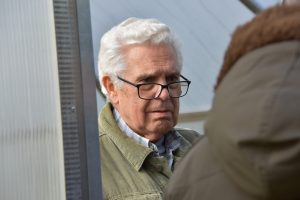
Tell us about ENVS283. Why are you focusing on Venezuela?
Antonio Machado-Allison (AMA): Being a Venezuelan scholar and witnessing what is happening in my country, one way I think I can help my people is to let citizens of other countries know how Venezuela arrived at these conditions. In the course we will discuss the key factors that have affected the development of Venezuela and its environment from the pre-colonial period to the present through the reading of interdisciplinary literature that includes anthropology, religion, sociology, environmental sciences, law, and history. Ultimately, we will examine the factors that have led to the collapse of democracy in Venezuela.
siebert honored as wildlife ambassador

Charles Siebert, the 2019-20 Menakka and Essel Bailey ’66 Distinguished Visiting Scholar of the College of the Environment, was honored at Born Free USA’s A Night for Wildlife event on September 26th with the Wildlife Ambassador award. Siebert was chosen for the award for “his work exposing the horrors and fallacies behind elephants in captivity.” His recent New York Times magazine cover story examined the importation of 18 African elephants by three U.S. zoos, and was a driving factor behind the passage of a new CITES (Convention on International Trade in Endangered Species) resolution that prohibits the future importation of wild elephants for zoo exhibits.
weil delivers “beastly” keynote
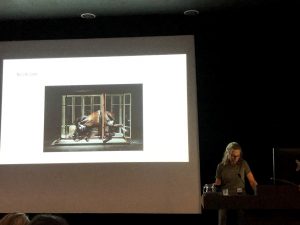 Last month, Kari Weil, University Professor of the College of Letters and a faculty member of the College of the Environment, delivered the keynote address at Beastly Modernisms, an international conference on the animal turn in modernist studies hosted by Glasgow University. Her keynote, entitled “Modernisms, Magnetisms, and the Beastly Burdens of Memory,” focused on animal magnetism–the force that one animal body can have one another.
Last month, Kari Weil, University Professor of the College of Letters and a faculty member of the College of the Environment, delivered the keynote address at Beastly Modernisms, an international conference on the animal turn in modernist studies hosted by Glasgow University. Her keynote, entitled “Modernisms, Magnetisms, and the Beastly Burdens of Memory,” focused on animal magnetism–the force that one animal body can have one another.
versey, ritter ‘19 explore environmentally induced displacement with coe faculty-student research grant
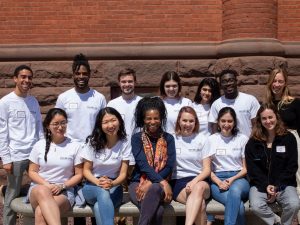 Assistant Professor of Psychology H. Shellae Versey, PhD and Emma Ritter ’19 launched a faculty-student research collaboration during the 2018-2019 academic year exploring Communities in Crisis: The impact of disasters on mental health. The research focused on environmental hazards—both natural and manmade—and the resulting effect on health and displacement among various communities. A COE faculty-student research a grant provided Versey and Ritter the opportunity to conduct research that would not have been otherwise possible.
Assistant Professor of Psychology H. Shellae Versey, PhD and Emma Ritter ’19 launched a faculty-student research collaboration during the 2018-2019 academic year exploring Communities in Crisis: The impact of disasters on mental health. The research focused on environmental hazards—both natural and manmade—and the resulting effect on health and displacement among various communities. A COE faculty-student research a grant provided Versey and Ritter the opportunity to conduct research that would not have been otherwise possible.
kim, nir ’19 & esposito ’19 collaborate on sound calendar
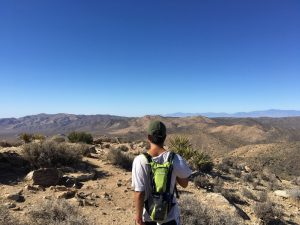
Want to hear more? Join us on October 31st at noon to listen, lunch and learn!
Adjunct Assistant Professor of Music Jin Hi Kim’s Sound Calendar of the Year 2018 is a year-long fusion of art and environmental sound ecology sponsored by the COE’s Faculty-Student Research Grant Program, which provides opportunities for faculty and students to work together on research projects. Harrison Nir ’19 is a composer and double major in music and anthropology. Nir’s work on the sound calendar was funded by a COE Summer Research Fellowship Grant. Psychology and SISP double major Marc Esposito ’20 also worked on the project.